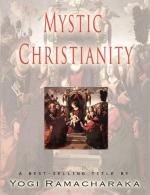In the first place we must remember that the soul of Jesus was different from the souls of other men. His was a “virgin birth”—not in the commonly accepted sense of the term, but in the occult sense as explained in the second lesson of this series. His soul was fresh from the hand of the Creator—His spirit had not been compelled to work through repeated incarnations, pressing forward for expression through humble and ignoble forms. It was free from taint, and as pure as the Fountain from which is flowed. It was a virgin soul in every sense of the term.
This being so, it follows that it was not bound by the Karma of previous incarnations—as is the case with the ordinary soul. It had no entangling ties—it had no seeds of desire and action planted in previous lives, which were pressing forward toward expression in His life. He was a Free Spirit—an Unbound Soul. And therefore He was not only unbound by any Karma of His own, but was also free (by nature) from the Karma of the race or of the world.
The absence of personal Karma left Him free from the selfish personal Desire which binds men to the wheel of action and personal ambition. He had no desire or thought for personal aggrandizement or glory, and was perfectly free (by nature) to work for the good of the race as an outside observer and helper, without suffering the pains and sorrows of race-life, had He so wished. But He chose otherwise, as we shall see in a moment.
The absence of Race-Karma, or World-Karma, freed Him from the necessity of the pains of humanity, which are a part of its collective Karma. He would have been perfectly able to live a life absolutely free from the pains, trials and troubles that are the common lot of Man, owing to the Race-Karma. He would have escaped persecution, physical and mental pains, and even death, had He so elected. But He chose these things of His own free will, in order to accomplish the great work that He saw before Him as a World-Savior.
In order for Jesus to enact His part as the Redeemer and Savior of the race, it was necessary for Him to take upon Himself His share of the Karma of the race—virtually taking upon Himself the “sins of the world.” Before He could lift the burden from the race of men, He must become a man among men.
To understand this more clearly we must remember that to a being such as Jesus—a soul free from Karma—there would be no such thing as temptation, longings, desires, or any of the mental states of the ordinary man with the Karma of successive past incarnations resting within him as seeds of action pressing forward ever for unfoldment and expression.
Jesus, the free soul, would have been practically an outside observer of the world’s affairs, and not influenced by any of its ordinary incentives to action. In this state He could have aided the world as a teacher and instructor, but He would not have been able to accomplish His great task of Redeeming the world, in its highest spiritual significance, as we shall see as we proceed. It was necessary for Him to take upon Himself the burden of the earth-life in order to become the Savior of the people of the earth.




